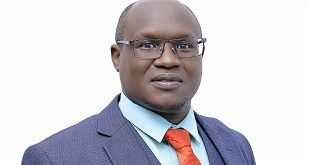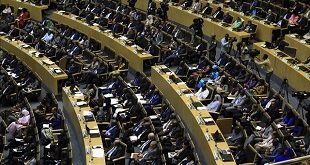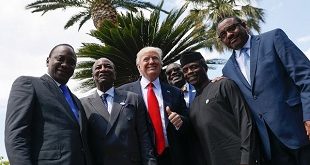
By Andrew M. Mwenda
The decision on whether Kagame stays or retires may be in the hands of international organisations
The fortunes of a nation, especially a poor one, are determined not only by its leaders and people but also by the interests and whims of powerful nations. This fact hung over the meeting of the National Executive Council (NEC) meeting of Rwanda’s ruling party, the Rwanda Patriotic Front (RPF) on February 8, 2012 (see cover story). As President Paul Kagame began his speech on his desire to relinquish the presidency, many RPF cadres were having second thoughts about the whole idea.
Kagame made it clear that he intends to leave the presidency in 2017. He even appointed a committee to oversee this transition. He did this in an environment where most of his party cadres and ordinary citizens were asking him to amend the constitution and stay.
Kagame plans to retire in 2017 for a number of reasons. He has said he needs a break – having made his contribution, he needs to rest. He has also told me severally that he believes the country has come a long way and that he has played his part. It is time for him now to hand over to the next generation of leaders. The issue in Rwanda is not “who” succeeds Kagame. Rather it is about “how” the RPF organises succession i.e. the process through which his successor is identified and selected.
Kagame appreciates that individuals can make things happen but institutions make things last. Throughout his presidency, he has tried his best to build institutions – both of the party and the state with a high degree of success. For example, today, the RPF as an organisation is institutionally strong with many individuals of leadership capability to succeed Kagame. That is why it is important to establish a credible and transparent succession mechanism that ensures that there is change with continuity.
Yet Kagame and the RPF need to recognise that institutions take generations to mature. And even then, they remain susceptible to reversal. A new leader can drag the country into chaos. Only a blind idealist would think that all Kagame has to do is leave the presidency and everything will be alright. Such a naïve, idealistic or even reckless exit would follow him at his farm in Muhazi. He would soon witness Rwanda go the way of Mali. Therefore, how he leaves and the structures he leaves in place will have powerful implications on the future of Rwanda and the stability of this region.
It is always good to hope for the best but plan for the worst. The president who will succeed Kagame will lack his clout, moral standing, overwhelming legitimacy and the respect (and fear) he commands. The first task of such a president will be to win over powerful individuals and groups. Therefore the first move will be to trade favours – hence corruption.
The RPF leadership now has a challenge to ensure that when Kagame leaves, the next president does not seek to destroy what has been built. In doing this, they may need to improve their institutions of accountability and control. One such mechanism – which many in RPF have voiced – is to have a president elected by the party with a majority in parliament as is done in South Africa. This gives the ruling party the power to recall a president if his conduct is injurious to the national interest. Having a president directly elected by the population for seven years may lock the country in a crisis.
Yet the decision on whether Kagame stays or retires in 2017 may be out of the hands of Rwandese and into the hands of international human rights and “humanitarian” organisations. As they continue to pressure western governments to sanction Kigali and indict its leaders including Kagame himself, many powerful individuals in the RPF and the military may begin to see things differently. They may realise that their future security and immunity lies in retaining power with Kagame as president. Kagame himself is a human being. If the choice is staying in power without international criminal prosecution or leaving it for a life at The Hague, even a fool can see where the dice will fall.
In many ways therefore the pressures by human rights organisations on Kigali (and other countries in the developing world) although overtly claiming to promote the cause of democracy, actually tend to subvert its realisation. By denying nuance, context and complexity, they take positions that threaten the security of those in government. Rather than force leaders of developing countries to improve governance, such pressure tends to force them to put in place measures to protect their rule from external subversion.
My intuition tells me that democracies are more susceptible to external manipulation compared to dictatorships. Electoral competition and free speech create room for rich foreigners to influence local politics. Thus, to assert their sovereignty, governments in poor countries, under pressure from human rights organisations and their home governments, tend to take measures towards authoritarian control. Thus the most independent-minded governments of poor countries oft turn out to be authoritarian because a dictatorship is much more difficult to subvert than a democracy.
For example, it was easier for the US to subvert the government of Salvador Allende in Chile (1973) Patrice Lumumba in Congo (1960), Mohamed Mossadegh in Iran (1953) and Jacobo Arbenz in Guatemala (1954) than it could ever be possible with Cuba under Fidel Castrol or Venezuela under Hugo Chaves. It follows therefore that repeated attacks on independent-minded governments of poor countries tends to facilitate an artificial selection that only allows governments that are authoritarian to survive.
One hopes that those who care about Rwanda learn this lesson i.e. that the best way to facilitate the flowering of democracy and peaceful transitions of power in developing countries is to leave as much space as possible to domestic political initiative. External interference, even when driven by noble intentions, has a tendency to becoming counterproductive. The experience of Zimbabwe under Robert Mugabe shows how externally driven attempts towards regime change, short of a direct military intervention like in Muammar Gadaffi’s Libya, tends not only to entrench a seating government but more critically, to push it towards greater repression and economic catastrophe.
 The Independent Uganda: You get the Truth we Pay the Price
The Independent Uganda: You get the Truth we Pay the Price


